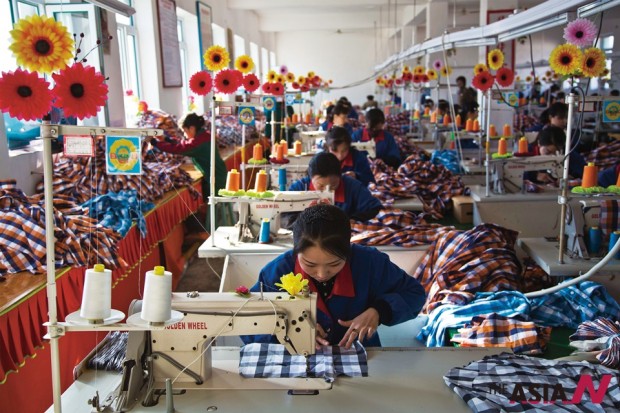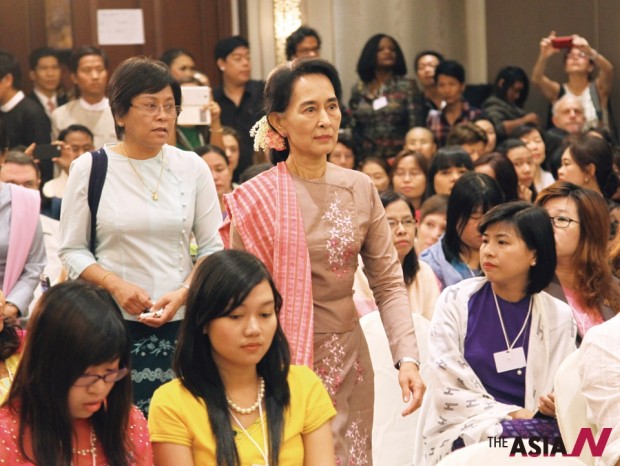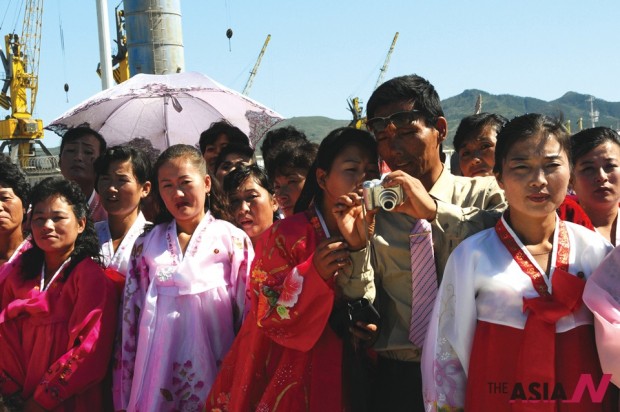Lessons from ASEAN engagement with Myanmar

In this Nov. 9, 2013 photo, North Korean seamstresses work at sewing machines at the Sonbong Textile Factory in Sonbong, North Korea, inside the Rason Special Economic Zone. (Photo: AP/NEWSis)
In the mass media, Korea is mentioned more often than not as a wholesome personality. It is when the headlines turn to “Tension in the Korean Peninsula” that its split personality becomes evident. Then we begin to see Korea described in diverse terms such as North and South as well as the Republic of Korea (ROK) and the Democratic People’s Republic of Korea (DPRK).
Notwithstanding its two political systems, from the top leaders down to the people, Koreans have not been moved to see themselves as one country and one people. This bond is anchored in its ancestry dating to the Bronze Age (233 BC).
At the family level, the two Koreas are like a pair of twins separated by dire circumstances and though estranged, each claims to be the elder brother who, in line with tradition, enjoys the privilege of running the household. Like what happened in Korean dynastic history, neither claimant wants to give in to the other, leading to feuds and contention.
It reminds me of the historical episode in the Romance of Three Kingdoms in which the two sons of Cao Cao, the King of Wei, tussled to inherit his throne. Cao Pei, being the elder, claimed succession and sought to kill his younger brother Cao Zhi. On their mother’s plea for mercy, Cao Pei agreed to spare Cao Zhi’s life on the condition that he composed a poem in court as he counted to seven. Cao Zhi made history with his classic Seven Steps Poem:
Two beans boiling a cauldron,
One was crying aloud,
“Both of us were born from the same parents,
Why cook me so mercilessly?”
His appeal to brotherhood touched a soft spot in Cao Pei, ending their enmity. The moral of the story is that kinship and cultural values may make a difference in any type of reconciliation that had so far eluded the two Korean states.
First, there was Kim Il-sung’s attempt to take over the country by military conquest. It looked like history repeating itself. More than a thousand years ago during the Samkuk Sagi era, the kingdom of Goguryeo with its capital in Kaesong (North Korea) had tried to subdue the rival kingdoms of Silla and Baekje. (In more modern times, dynastic supremacy swung to the Joseon Kingdom (1392-1910) with its capital in Hanyang, present-day Seoul.) The DPRK invasion was foiled by the intervention of the United States and United Nations.

Thanks to the successful ASEAN engagement, Myanmar became a respected member of the international community. Myanmar opposition leader Aung San Suu Kyi, center, arrives for a dialogue entitled “Developing leadership for tomorrow” of the women's forum in Yangon, Dec. 7, 2013. (Photo: AP/NEWSis)
Twins separated by dire circumstances
The military option was then replaced by diplomacy, including the secret contacts by Park Chung-Hee and Kim Il-Sung to seek an accommodation in response to the rapprochement between the US and China in the 1970s. This had resulted in a joint communiqué, spelling out the principles of unification by independent peaceful efforts and not by force of arms as well as without foreign interference. Both sides also undertook not to produce nuclear weapons.
The euphoria atmosphere engendered by ROK’s economic prowess led President Kim Young-Sam to entertain hopes of unification by absorbing the weaker and poorer DPRK. This turned out to be a non-starter given the prohibitive costs involved as gleaned from the German re-unification experience.
Next came the “soft landing” approach by President Kim Dae-jung to engage and help modernise the DPRK’s economy to converge with the ROK to pave the way for unification.
Kim’s Sunshine Policy, inspired by Aesop Fables’ on the North Wind and the Sun, produced a leaders summit in Pyongyang and the Kaesong Industrial Complex, where more than 100 South Korean light industries began to employ 47,000 North Korean workers.
This, together with the Kumgang Mountain tourist resort and other projects funded by Hyundai Corporation, showed the DPRK the benefits of economic co-operation, especially in the hard currency it had earned yearly from the ventures.
The Kumgang resort also opened the way for visits by South Korean tourists and re-union of families separated by the war. To be sure, Pyongyang had shown no qualms in suspending or closing the Kaesong or Kumgang operations to protest against Seoul over de-nuclearisation.
Even so, engagement with the DPRK remains the most viable and sensible option, as seen from ASEAN state’s success in the opening of once-reclusive Myanmar. The United States and other Western countries had chosen to cut off diplomatic ties and imposed sanctions against the Myanmar military junta to make them change their ways.
While the generals might have feared the threat of regime change from the US, they had not been cowed into submission. But, ASEAN offered them a graceful way out of their predicament, allowing them not to lose their grip on power while accommodating the pro-democracy movement led by Aung San Suu Kyi. They probably took a cue from Indonesia’s General
Suharto in carving a dual military-cum-civilian role for the army and staying in power through elections.
The dramatic electoral and economic reforms carried out by former general President Thein Sein in tandem with opposition leader Daw Suu Kyi have made Myanmar a respected ASEAN member that is increasingly embraced by other nations, including the US and European Union.
ASEAN’s experience with Myanmar also points to the value of a grouping that could exert collective influence in a positive way. The countries engaged with the ROK and the DPRK in the de-nuclearisation talks might not belong to a cohesive group, but they could nevertheless exert some influence on the separated twins on their future. True, both of them have always viewed re-unification as a family affair that outsiders should not interfere in.
Putting his people on notice, President Lee Myung-bak, who disavowed the Sunshine Policy for one based on quid pro quo, had mooted the idea of a unification tax. However, some political analysts have a changing perspective that the humongous price South Korea would have to fork out for immediate relief and long-term reconstruction for North Korea might merit getting the international community to be involved in handing the difficult and complex re-unification process.
In other words, the weight of international opinion plus possible aid and assistance offers a new equation into peaceful re-unification that could only be a plus for all interested parties. One alternative scenario is a horrendous war involving the use of nuclear and chemical weapons by North Korea targeting the US forces. Another scenario, according to analysts is regime collapse. Indeed, the US is said to have an operational plan to deal with a full or partial collapse of the DPRK regime that might trigger a war.
The fear of a power struggle following Kim Jong-il’s death in December 2011 leading to a dynastic collapse did not happen – to much relief. His son Jong-un assumed his mantle without the benefit of the two-decade long grooming that the senior Kim had. Hence, the uncertainty over how DPRK will pan out in the immediate future.

Residents dressed in traditional clothes stand at the port before the opening ceremony of the cross-border railway connecting Rajin to Hasan of Russia in Rason, North Korea Sept. 22, 2013. (Photo: Xinhua/NEWSis)
No cultural shock
The peaceful re-unification scenario may come about, some say, if generals in the North decided it would be in their best interest to work with business tycoons in the South like Kim Jong-il did with Hyundai and other chaebols.
There is a catch here. Kim Jong-un would have to go along with his generals. But would he cede his power without a fight? The young leader is just starting out and may be more game for new ways of doing things.
Tapping into this IT savvy outlook, Seoul could engage him more on the technology level. In seeking to open doors in the North, Hyundai corporate founder Chung Ju-yung had symbolically driven 500 heads of cattle across the border to Pyongyang.
In emulating his feat, someone like says his Samsung counterpart may want to deliver 5,000 sets of computers for the students in North Korea. Myanmar’s drive for democracy would not have taken off without its students and other citizens embracing and defending freedom and human rights.
With better access to the Internet and social media, the younger generation in DPRK would get to learn more about how their counterparts down south live, work and play. In doing so, they would have a longer lead time to adjust to living together with their blood relations under one roof, as it were. Then they would not suffer a cultural shock!

































































